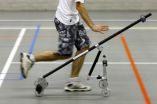(Press-News.org) A team of Boston University researchers has found that the majority of individuals with substance dependence problems report having poor oral health. They also found that opioid users, in particular, showed a decline in oral health over the period of one year. These findings appear online in the Journal of Substance Abuse Treatment.
Public health, dental medicine and internal medicine faculty from Boston University investigated the affects of different substances on oral health among a sample of substance-dependent individuals. Alcohol, stimulant, opioid and marijuana users were included. The subjects were asked to self-report their oral health status on a five-point scale ranging from poor to excellent.
Statistical analysis of the patients' reports found no significant associations between the types of substances used and oral health status. The results did show, however, that 60 percent of all subjects reported fair or poor oral health. Opioid users in the sample also exhibited worse oral health compared to one year ago.
"We found that the majority of our sample reported fair or poor oral health," said Meredith D'Amore, MPH, a researcher in the Health/care Disparities Research Program at Boston University School of Medicine and Boston Medical Center. "Thus, oral health should be considered a significant health problem among individuals with substance dependence and providers should be aware of potential oral health issues."
The researchers hope that their findings prompt more oral health interventions targeted toward individuals with substance dependence in the future. They also suggest that engaging addicts in medical care discussions may be facilitated by addressing oral health concerns.
### END
Boston University researchers find most substance–dependent individuals report poor oral health
2011-04-15
ELSE PRESS RELEASES FROM THIS DATE:
University of Toronto researchers 'brighten' the future of OLED technology
2011-04-15
Chlorine is an abundant and readily available halogen gas commonly associated with the sanitation of swimming pools and drinking water. Could a one-atom thick sheet of this element revolutionize the next generation of flat-panel displays and lighting technology?
In the case of Organic Light-Emitting Diode (OLED) devices, it most certainly can. Primary researchers Michael G. Helander (PhD Candidate and Vanier Canada Graduate Scholar), Zhibin Wang (PhD Candidate), and led by Professor Zheng-Hong Lu of the Department of Materials Science & Engineering at the University of ...
Why does a moving bicycle not fall over? TU Delft casts aside some old theories
2011-04-15
Given sufficient forward speed, a bicycle pushed sideways, will not fall over. Scientists have been trying to find a conclusive explanation for this remarkable characteristic for over a century. This week, researchers at Delft University of Technology (TU Delft, The Netherlands) have thrown new light on the question in a publication in Science.
Staying stable
The research at TU Delft, in collaboration with scientists from Cornell University (USA), centred on the following intriguing question: why is a bicycle self stable, above a certain speed? You add speed to a bike ...
Highest percentage of Americans in 4 decades say financial situation has gotten worse
2011-04-15
A recently released report of the General Social Survey, conducted by NORC at the University of Chicago, shows that for the first time since 1972, more Americans say that their financial situation has gotten worse in recent years rather than better. Understandably, also for the first time since 1972, the percentage of Americans saying that they are "not at all" satisfied with their financial situation (31.5%) notably exceeds those saying they are "pretty well" satisfied (23.4%).
The General Social Survey which NORC has conducted for forty years, is supported by the National ...
People who overuse credit believe products have unrealistic properties
2011-04-15
COLUMBIA, Mo. – A University of Missouri researcher says people who overuse credit have very different beliefs about products than people who spend within their means. Following a new study, Marsha Richins, Myron Watkins Distinguished Professor of Marketing in the Trulaske College of Business, says many people buy products thinking that the items will make them happier and transform their lives.
"There is nothing wrong with wanting to buy products," Richins said. "It becomes a problem when people expect unreasonable degrees of change in their lives from their purchases. ...
TBI Therapy and Nutrition: IOM report releases April 20
2011-04-15
Nutrition research is pointing to ways that nutrients or diets may lessen the effects of traumatic brain injury (TBI), raising the possibility that the U.S. Department of Defense might be able to use nutritional approaches to help personnel who receive a TBI. Nutrition and Traumatic Brain Injury: Improving Acute and Subacute Health Outcomes in Military Personnel, a new report from the Institute of Medicine, recommends which nutritional approaches DOD should adopt and priorities for further research into nutrients and diets that show promise for being effective in providing ...
Targeting top 911 callers can trim cost, improve patient care
2011-04-15
Repeated unnecessary 911 calls are a common drain on the manpower and finances of emergency medical services, but a pilot program that identified Baltimore City's top 911 callers and coupled them with a case worker has succeeded in drastically cutting the number of such calls while helping callers get proper care.
The program, called Operation Care, was conceived and implemented by the non-profit agency Baltimore HealthCare Access and ran as a three-month pilot in 2008. Now, a newly published report of its results appearing in The American Journal of Emergency Medicine ...
Studies of marine animals aim to help prevent rejection of transplanted organs
2011-04-15
(Santa Barbara, Calif.) –– Studies of the small sea squirt may ultimately help solve the problem of rejection of organ and bone marrow transplants in humans, according to scientists at UC Santa Barbara.
An average of 20 registered patients die every day waiting for transplants, due to the shortage of matching donor organs. More than 110,000 people are currently waiting for organ transplants in the U.S. alone. Currently, only one in 20,000 donors are a match for a patient waiting for a transplant.
These grim statistics drive scientists like Anthony W. De Tomaso, assistant ...
Older workers benefit from high-tech, high-touch health promotion
2011-04-15
Older workers benefit most from a modest health behavior program when it combines a web-based risk assessment with personal coaching.
University of Illinois at Chicago researchers conducted a randomized trial to evaluate two worksite wellness interventions assessing older workers' health behaviors and outcomes. The findings are available online and will be published in an upcoming issue of the American Journal of Public Health.
The health behaviors that were examined were physical activity, diet, stress reduction and smoking cessation, says Susan Hughes, professor of ...
Novel therapy improves immune function in teen with rare disease
2011-04-15
In a novel approach that works around the gene defect in Wiskott-Aldrich syndrome, an inherited immune deficiency disorder, researchers used an alternative cell signaling pathway to significantly improve immune function in a 13-year-old boy with the disease. The study, at The Children's Hospital of Philadelphia, provides a proof-of-principle that immunotherapy, which harnesses elements of the body's immune system, may be used to treat this rare but often deadly disorder.
"If this encouraging initial result holds up in further ...
Inability to detect sarcasm, lies may be early sign of dementia, UCSF study shows
2011-04-15
By asking a group of older adults to analyze videos of other people conversing -- some talking truthfully, some insincerely -- a group of scientists at the University of California, San Francisco has determined which areas of the brain govern a person's ability to detect sarcasm and lies.
Some of the adults in the group were healthy, but many of the test subjects had neurodegenerative diseases that cause certain parts of the brain to deteriorate. The UCSF team mapped their brains using magnetic resonance imaging, MRI, which showed associations between the deteriorations ...


